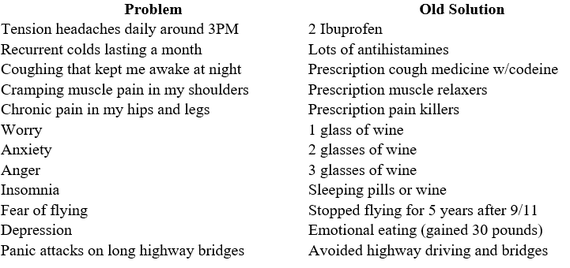When I first got into the stress management business, I was stress sensitive and didn't even know it. I would occasionally suffer from stress-related health problems and not even fully appreciate the irony, or even care. And that's one of the enduring mysteries of stress: why we don't always see how stress affects us. Why we don't see how grumpy we've become, or how easily upset we are, or why we ignore the headaches we get, or the colds we catch, or the stomach pain we experience after a particularly stressful episode in our lives. We just don't connect the dots back to our stress, or if we do, we never really see it clearly enough to do much of anything about it.
And this even applies to so-called experts on stress like me!
This list contains of some of the stress-related conditions that affected me over the first 10 years of running a stress management business and some of the counterproductive coping strategies I'd employ to deal with them.
Let me be the first to say that when you suffer from a stress related condition, stress is usually just one component of the problem and not necessarily the cause of it. Stress just makes things worse, makes you more vulnerable to developing the problem and that's why it's a tricky thing for doctors to diagnose. For example, when I would catch a cold, one of my three kids would usually get it first, so who's to say whether it was the stress in my life that made me vulnerable or the rhinovirus that I was exposed to? Still studies conducted at Carnegie Mellon University (where test subjects were exposed to the rhino virus and then sequestered for five days) have shown that the study participants who reported high levels of stress, were much more likely to develop colds than those who reported little or no stress.
So without knowing conclusively whether my illnesses were stress related, none of these health problems bothered me too much. I just tried to ignore them until they went away and usually they did. For example, long before 9/11 I was afraid of flying, but I'd still fly when I had to. After 9/11 I just started driving everywhere, including destinations that were up to a 20-hour long drive away. But I assumed that if I ever really needed to fly some place I would.
But when I started having panic attacks driving over bridges, the long ignored high levels of stress in my life had to be addressed. But before I tell you exactly what I did to right my ship, let me tell you what I did wrong for so long to bring me to this point.
In a nutshell, I always chose the simplest, easiest solution to my stress-related problems (as most Americans do). But these band-aid solutions would only MASK the SYMPTOMS of the problem. At first I did things like take more and more ibuprofen. Then I tried drinking more and more wine. Later I tried just avoiding the problem altogether, by not doing things like flying. I was attempting to mask the symptoms without addressing them at the source.
There were two psychological issues at work here. Avoidance of the things that caused me anxiety is called maladaptive coping. Trying to fix the symptoms is sometimes called counter-productive or negative coping. This is where we cope with our stress by engaging in lots of unhealthy behaviors such as smoking, drinking, overspending, gambling and emotional eating. The reason we engage in these behaviors is to distract ourselves from the stress we feel inside. It makes us feel better temporarily, but often leads to other problems like weight gain, financial problems and substance abuse. This phenomenon is often called self-medicating and we self-medicate with both substances and behaviors including over-the-counter medications, street drugs and/or behaviors like gambling and high risk activities. Some people even go to their doctor and get hooked on many of the prescriptive solutions to these problems like sleeping pills, pain killers, cough medicine and medicines for heart burn and other digestive tract disorders.
The trouble with these approaches is that typically you may be just treating your symptoms and not addressing the source of the problem. In fact, this is roughly the equivalent of disabling a warning light on the dashboard of your car rather than fixing the problem that is causing the warning light to flash.
By disabling the warning light, you have only masked a symptom of the problem. And with all of the stressful problems on my list, that's exactly what I did. And you know what? If you're going through a stressful period in your life that is only TEMPORARY, this MASKING approach might actually work: it helps get you through the stressful crisis. It helps you keep going. And when your stress eventually subsides, you stop taking the medicine and your life returns back to normal.
But many of us are chronically stressed, or our stress comes back after a short period of remission. As a result, the pain (that you were able to at first ignore) gets worse while you keep attempting to cover it up. Eventually the only reason you may be able to KEEP GOING is that you are pharmaceutically propping yourself up. Your symptoms are your body's way of saying SLOW DOWN. But you can't hear the message because you've disabled the warning light! And this simply creates a vicious cycle where eventually the pain spirals out of control and the medication might not do anything to stop the pain.
But here's the good news, there are lots of medically approved, integrative approaches to solving your stress-related health problems that don't involve taking pills, drinking wine or eating cartons of ice cream. I'll address that next month.
